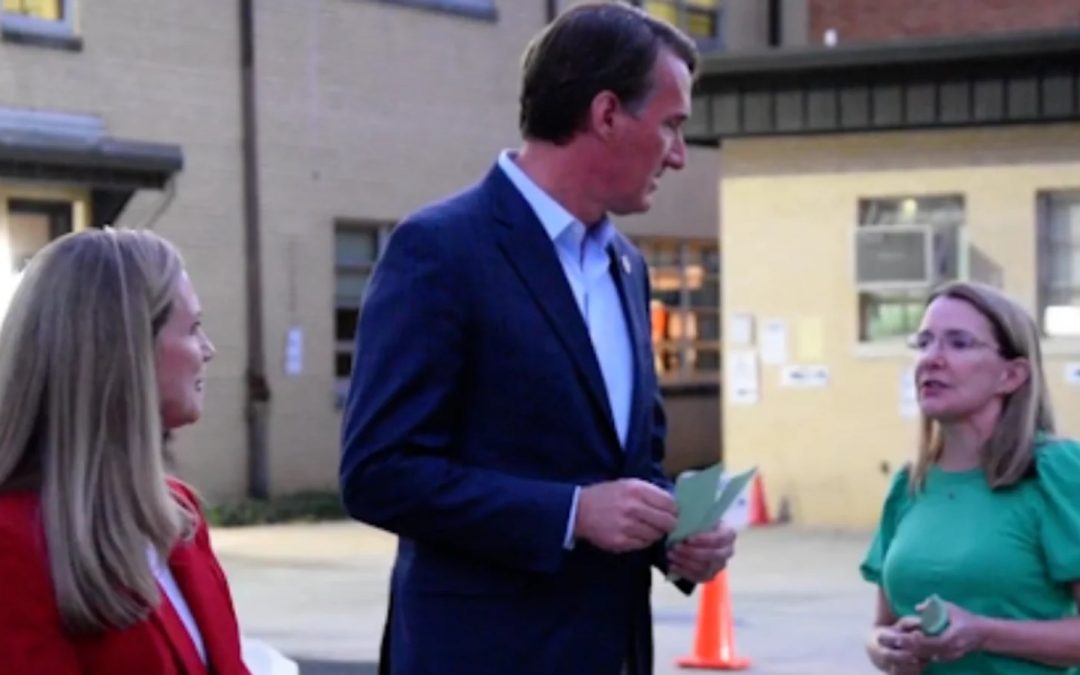FREDERICKSBURG, Va. – Sitting beneath a red, white, and blue banner with “Fredericksburg Democrats” printed across the top, volunteer Donna Blalock watched her nearly-eleven-year-old granddaughter run around the parking lot at Walker-Grant Middle School, passing out sample ballots to voters exiting their cars.
The ballots included candidates for races ranging from school board to Virginia General Assembly. But for Blalock, who has been volunteering to promote Democratic candidates since before the Obama administration took office, this year’s election wasn’t about any one candidate or race. It was about the reproductive rights of Virginians across the state, and Republican Gov. Glenn Youngkin’s proposal to end abortion access at 15-weeks with a few exceptions.
“People are losing rights that I took for granted when I was a kid… I’ve got grandchildren, they have to be able to own their own bodies,” Blalock said. “I am not willing to have a world where my granddaughter has less rights than I do. It’s not acceptable.”
For purple Virginia, a handful of swing districts determined that the abortion restrictions that Republican candidates rallied around would not move forward, since Democrats won narrow control of the state legislature. Despite efforts to present a moderate stance on abortion, Republican candidates lost in the blue-leaning districts they needed to win to push Youngkin’s agenda forward.
Prior to the 2023 election, Republicans controlled the Governor’s office and Virginia House of Delegates, but a Democrat-led state Senate blocked Republicans’ previous attempts to enact restrictions on abortion.
According to a Christopher Newport University poll released ahead of the election, 54% of likely voters opposed or strongly opposed a 15-week abortion ban and only 39% supported or strongly supported one. The same poll found 55% of voters approve of Youngkin.
The 2023 election presented an opportunity to claim senate control for Republicans, which would have cleared the path for legislation to restrict abortion access. Leading up to the election, Gov. Youngkin largely coalesced his party around campaigning for a 15-week abortion restriction with exceptions, presenting the position not as a ban, but as a “limit” on abortions.
On Tuesday evening, Youngkin greeted voters outside Tuckahoe Elementary School, a polling location in Henrico County, with state senator Siobhan Dunnavant and House of Delegates candidate Riley Shaia.
“We’ve been very clear about the bill that I would support. A bill that would protect life at 15 weeks where a baby can feel pain, with full exceptions in the case of rape, incest, and when a mother’s life is at risk,” Youngkin told reporters on the night of the election, echoing his statements throughout the campaign. “We’ve found a place of reasonableness. A place where Virginians can come together on one of the most difficult topics in Virginia.”
Henrico was one of the many areas that were affected by the recent redistricting of political boundaries across Virginia, following the 2020 census. The 2023 election was the first time the legislature would be determined with the newly drawn map after a redistricting effort that was largely seen as fair by nonpartisan experts. Control of the Statehouse rested in six swing districts in the state Senate and ten swing districts in the House of Delegates in this close election, according to the nonpartisan Virginia Public Access Project.
Democrats played defense, aiming to retain their majority in the Senate and reclaim the House majority they lost in 2021 to stave off the conservative agenda, including Youngkin’s 15-week “limit” on abortion.
It worked. Democrats picked up three seats in the House of Delegates to win a 51-seat majority in the 100-member chamber and held on to their Senate majority with 21 seats to Republicans’ 19.
Republican candidates in the swing districts embraced Youngkin’s proposal, except for two candidates in close districts in the Richmond suburbs of Henrico county, Siobhan Dunnavant and Riley Shaia. An OBGYN, Dunnavant was the only Republican Senator to vote against Youngkin’s proposed 15-week restriction in January due to a lack of exceptions for severe fetal abnormalities. Shaia would not commit to supporting Youngkin’s abortion proposal throughout the campaign.
“I know that having listened for all this time that I have a consensus position,” said Dunnavant on election night. “Most people agree that 15 weeks, four months, is very reasonable. And everyone agrees with exceptions for rape, incest, and life of the mother, and I have the additional exception of fetal abnormalities.”
However, despite attempts to distinguish themselves from Youngkin’s position, both women lost their races Tuesday night.
The Nov. 7, 2023 election marked Virginia’s first Statehouse election since the Supreme Court’s 2022 decision to overturn Roe v. Wade. The 1973 ruling previously affirmed an individual’s right to an abortion before fetal viability, roughly 24 weeks. In Virginia, abortions are currently legal during the first two trimesters of pregnancy, with medical exceptions for third-trimester abortions.
In one of the closest state Senate contests, Democrats defeated Dunnavant, the District 16 incumbent, to ensure their slim majority. VPAP rates 20 of the State Senate districts on the new map to be leaning toward Democrats, meaning that the party only had to win all the seats leaning toward Democrats and one tossup district to maintain their majority in the upper chamber.
Similarly, Democrats held an advantage in safe districts in the House of Delegates going into Tuesday night, with VPAP rating 48 of 100 districts as safe or leaning Democrat.
Democrats won four of the ten closest districts, notably winning only one district with a Republican partisan lean, District 21. But otherwise, in both the state Senate and House of Delegates races, Republicans and Democratic candidates won the districts with a partisan lean favorable to their candidates.
Although pundits suggested that Virginia voters rejected Youngkin’s abortion ban, Democrats’ narrow win of the Statehouse aptly reflected the nonpartisan map and blue lean of the commonwealth.
The average voter turnout in the most competitive districts was 45%, and Democrats won in six of the eight districts with above-average turnout. Voters concerned about the future of abortion rights, such as Blalock back in Fredericksburg, powered Democratic victories, but that turnout wasn’t enough to win in most of the Republican-leaning competitive districts.
Youngkin’s 15-week abortion restriction proposal was now off the table in Virginia, but it was more difficult to assess whether that proposal brought down the Republicans in an election where they won half of the most competitive Senate districts, more than half of the competitive House districts, and came within three seats of being able to pass that policy.
The state’s current abortion policy was expected to stay in place, though abortion access would remain vulnerable without the federal protection it received under Roe v. Wade.
In the face of that uncertainty, Blalock planned to be there, passing out ballots and casting her own vote in the next election, and the election after that, and the election after that.
“There is no moderation in allowing people autonomy over their bodies. I’m not willing to negotiate with people who have no medical degree, no stake in the game,” she said. “I have five grandchildren. I am not willing to sit back and do nothing and tell them, ‘Oh, yeah, it was inconvenient. It was sad. I’m sorry that you had your rights eroded.’ I have to know that I did something, and show them you can do something too.”


